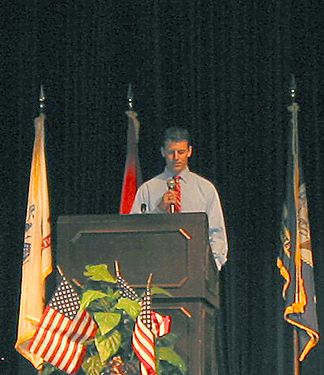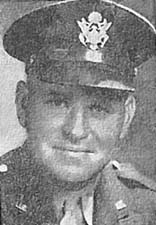 |
jacklummus.com Home Page Search Contact Us Site Map
Click the <Back> arrow to return to the previous page.
Ryan McLemore
Ellis County Veterans Appreciation Day, Saturday, November 12, 2005
 |
Reading the Will Armon Yates Story
We were soldiers by Perry Giles
My name is Will Armon Yates. I was raised in Waxahachie on the south side. My mom called me Willie.
I was named after my dad, Armon. But he died when I was only 4 years old, so my mother had to raise me on her teacher’s pay. Mom’s family, the Farrar’s helped us along. She taught school at Bullard Heights, and I spent a lot of time south of Waxahachie Creek on “The Hill”. Sometimes I worked as a hand on some of the nearby farms.
After graduating Waxahachie High School, I went on to attend John Tarleton College in Stephenville and then I transferred to the University of Texas where I received my B.A. degree. I have to give credit to my mom, Mary, for seeing me through with my education, even though she was on her own.
For a time I lived at 507 Ross Street, and I was a member of the Main Street Christian Church. I remember that the girl that I was really sweet on lived on Buena Vista Road.
I joined the Army on April 9, 1941 and in October was transferred to the Air Corps. I attended navigation school at Kelly Field, which was located on the southwestern edge of San Antonio.
When the war came, I was ready for duty as a 2nd Lieutenant navigator of any multi-engine plane of the Air Corps. They put me with the crew of a B-24 Liberator bomber. We were trained as submarine hunters. The German U-boats had been having their way in the Atlantic and our job was going to be to seek them out and engage them in combat.
When the order came down, we took off for North Africa. When we finally arrived they stationed us in Port Lyautey, French Morocco. We were assigned to the Army Air Forces Antisubmarine Command. What a forsaken place this was! Morocco, hot, dry, dirty and sandy; it made Ellis County look like a green heaven on earth.
My buddies in the squadron called me “Bill”. We were with the 2nd Anti-Submarine Squadron of the 480th Group. We got set up and operational in the spring of ’43. We were sort of a pioneer organization in the Air Corps. What we had been assigned to do, had never been done before. A lot of what we did was trial-and-error. Our mission was to patrol the open ocean for a thousand miles to the west and north of Gibraltar and engage enemy subs.
The German U-boats were massing in that area because of all the Allied ships that had to go through the Straits of Gibraltar. It was the only way in and out of the Mediterranean. We had been losing the war of the Atlantic in ’42 and our squadron was there to see what we could do to turn things around.
Most often we met the Germans in an area known as “Coffin Corner”, several hundred miles off the west coast of Spain and Portugal, where the U-boats surfaced to charge their batteries. We tried to hit them before they could gang up into a wolf pack. Our job was seek them out and kill them, or at least force them to remain underwater so much as to reduce their time in the target area.
When we could surprise a submarine on the surface, we would dive on it in a strafing run and drop our four 350 pound depth charges on it. It took the U-boat a few minutes to submerge, and it took us a few minutes to dive down on them. It was a real race of life and death.
There were many tedious hours of flying and boredom mixed in with some moments of sheer terror and adrenaline rush. We flew many missions in restricted visibility, bad weather and low ceilings; and hundreds of miles out to sea. So it was up to me, the navigator, to get us to the right spot and then back home again. There were many times when I felt responsible for the lives of the other nine crewmembers.
Sometimes we had run-ins with German warplanes, mostly Junkers JU-88s and some Focke Wulf Condors. None of our planes, or theirs, were really made for aerial dog-fighting, but we had some running gun battles nonetheless. Our squadron took some losses.
For several months the German Command had decided that their U-boats would stay on the surface and fight single aircraft with their anti-aircraft weapons. The Nazi subs had some good success against our Navy PBY Catalinas. But against a B-24, it was a little more even match-up. That turned into a real test of nerves, with the tracer bullets flying in both directions, it was like an old west shootout, to see who would flinch first.
On July 8, 1943, we were patrolling about two hundred miles northwest of Lisbon, Portugal when we spotted a submarine on the surface in the distance. We began a high-speed strafing run on it. This was it! This was what we had trained so many months for.
The plane was vibrating and bouncing from our four 1200 horsepower engines at maximum rpm’s and all the forward guns firing away. Nerves tensed up. The noise was tremendous, and my heart and my mind were racing, but instinct and training kicked in. The bombardier was riding up front in the glass nose of the plane with his finger calmly above the release switch, and a hailstorm of anti-aircraft fire flying all around him. You could hear some of the bullets hitting our wings. A couple came through our cockpit.
Just before it seemed as though we were going to crash into the U-boat’s conning tower, we pulled up and let go our depth charges. There were explosions. I looked back to see the U-232 blown apart. We circled back around to watch it sink.
For a few moments there was a wild celebration among our crew, and then there was silence. I think some of us were doing some praying. I marked our position and took some pictures, even though my hands were still a little shaky. I’m not sure how any of us ever survived all that gunfire flying straight up at us. I just don’t see how.
The next month, August, the German U-boat activity dropped off, or at the very least, the wolf packs had moved away from Gibraltar. During a 10-day stretch in July, our 480th Anti-Sub Group had attacked fifteen U-boats, damaging four and sinking three others. In my opinion, we had reached a turning point in the battle for the Atlantic. We were really making a difference!
We were expecting to be re-deployed in September, farther to the east in Tunis. From there we were going to be flying air cover for Allied convoys in the Mediterranean. The invasion of Italy was about to get started. We were hoping for more pleasant surroundings than Morocco, but I wasn’t counting on it.
As it turned out, September the 4th was my last mission. I was killed in action returning to base. It was a Saturday and I was only 27 years old.
We were soldiers once and young.
Remember us.
 |
Will Yates, hero of Ellis County, was awarded the Air Medal with oak leaf cluster. The citation read that he “displayed outstanding initiative, resourcefulness and a high degree of skill under many trying conditions…”
The Distinguished Flying Cross was awarded to 1st Lt. Yates posthumously.
It was presented to his mother at a formal ceremony at Love Field in Dallas. The citation noted “extraordinary achievement as a navigator, expert skill, unusual vigilance, marked aggressiveness and high courage in the face of anti-aircraft fire... [His actions] gave evidence of a high state of training and morale… reflecting great credit upon himself and the Army Air Forces”.
The month following his death, his unit was awarded a Presidential Unit Citation. This cites “outstanding performance of duty in action with the enemy… the 480th Antisubmarine Group has contributed with heroism and superior efficiency to the winning of the Battle of the Atlantic. Its record is inspiring and worthy of emulation”.
With such men the Second World War was won.
Veterans Appreciation Day 2005
The above story appeared in the Waxahachie Daily Light during the week of Veterans Day.
*Editor's note: Perry Giles, in his unforgettable way, has given voice to many of our local fallen heroes. Through countless hours of research and interviews with family members and friends, he pieces together the events, thoughts and feelings of those who have sacrificed everything so that we may live in peace and freedom.
*Ennis Daily News
The story is courtesy of Perry Giles, Giles Monument Company, Waxahachie, Texas.
A shortened version of the newspaper article was read at the Ellis County Veterans Appreciation Day ceremony.
Click the <Back> arrow to return to the previous page.
© 1999-2007 Utility Press Inc. All rights reserved.